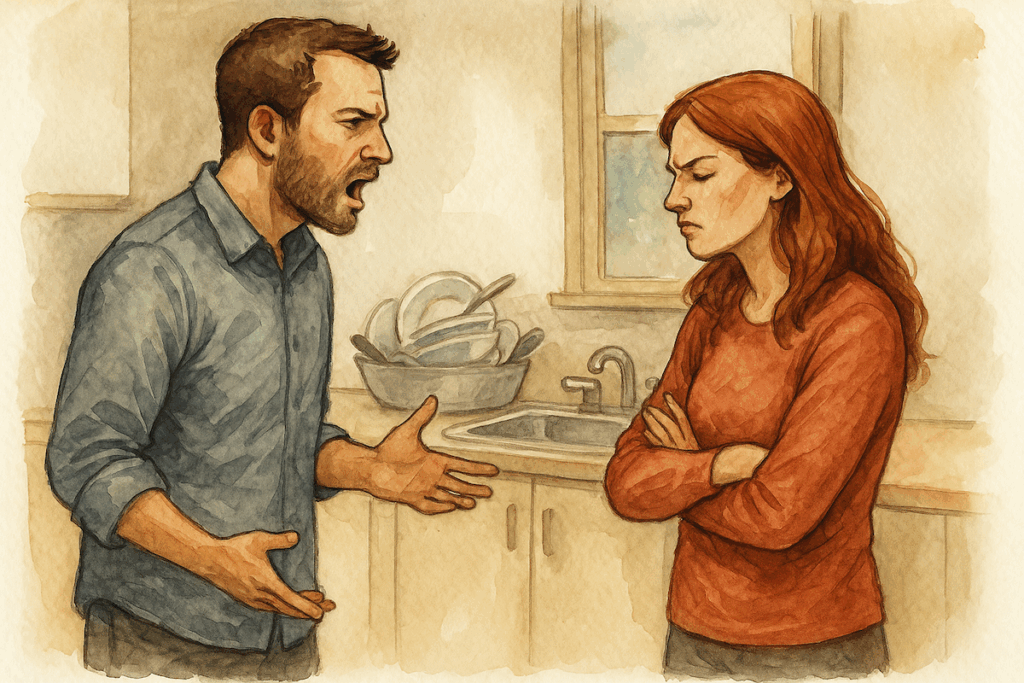You’re in the middle of a conversation—or an argument—and suddenly, you’re not really there anymore.
Your mind goes blank. Your body feels heavy or distant. You stop making eye contact. You can’t think of what to say. And when your partner asks, “What’s wrong?” you honestly don’t know.
Later, you might be frustrated with yourself:
- Why can’t I speak up in the moment?
- Why do I freeze every time there’s tension?
- What’s wrong with me?
The answer is: nothing is wrong with you. You’re likely experiencing a nervous system shutdown—a protective response your body learned long ago to survive emotional threat.
And you’re not alone.
🧠 What Is Shutdown?
Shutdown is part of the “freeze” or “fawn” response in the autonomic nervous system. It’s what happens when our system perceives threat—but fight or flight isn’t available or feels unsafe.
This is especially common in people who:
- Grew up in emotionally unsafe environments
- Were punished or shamed for expressing needs
- Experienced unpredictable or chaotic caregivers
- Are neurodivergent and easily overstimulated
- Learned to please, appease, or disappear to stay connected
In the moment, your body isn’t being dramatic—it’s trying to protect you.
🧭 What Conflict Feels Like to a Dysregulated Nervous System
Even when your partner is calm or loving, your system might interpret conflict as danger if it carries echoes of:
- Rejection
- Shame
- Abandonment
- Emotional flooding
- Uncertainty or powerlessness
This can lead to responses like:
- Going silent or agreeing to end the conversation
- Feeling blank or disconnected from your own thoughts
- Numbness or fatigue
- Wanting to escape or go to sleep
- Feeling like a “child” again in the moment
- Dissociation (spacing out, losing time, going foggy)
You may look calm—but inside, you’ve gone offline.
🔄 The Shutdown Cycle
Over time, this becomes a pattern:
- A triggering moment happens (tone, expression, emotion).
- Your nervous system perceives it as threat—even if it isn’t.
- You freeze or fawn to preserve connection or reduce risk.
- Later, you feel ashamed or frustrated.
- You may avoid future conflict—or overexplain, apologise, or shut down again.
Therapy helps you break this cycle—not by “trying harder,” but by working with the system that’s trying to protect you.
🧘 How Therapy Helps You Stay Present During Conflict
You don’t need to “toughen up.” You need tools, support, and nervous system safety.
In therapy, we work to:
- Identify your triggers (sensory, emotional, relational)
- Understand your unique shutdown profile
- Build body-based regulation skills
- Reconnect with voice, choice, and self-trust
- Practice boundaries and emotional communication at a safe pace
- Heal the relational wounds underneath the reaction
It’s not about confrontation. It’s about capacity building—so you can stay with discomfort long enough to stay inconnection.
🔧 Tools to Begin Working With Shutdown
Here are a few simple, body-informed practices we often start with:
- Sensory Anchoring: Notice what your hands are touching. Wiggle your toes. Smell something grounding (peppermint, citrus).
- Breath Awareness: Inhale through the nose for 4 counts, exhale slowly for 6. Lengthening your exhale tells your body you’re safe.
- Safe Gesture: Place one hand on your heart, one on your belly. Squeeze gently. Remind yourself, “I’m here, and I’m okay.”
- Scripted Boundaries: “I need a short pause—I want to stay connected, and I need a moment to breathe.”
- Aftercare Plans: Debrief with your partner gently after conflict. What worked? What didn’t? What would help next time?
These tools don’t fix everything—but they help your body stay in the room long enough to feel safe again.
💬 Helping Partners Understand Shutdown
If you’re in a relationship, you may worry your shutdown looks like stonewalling or indifference. It’s helpful to share:
- That your system isn’t choosing disconnection
- That you often don’t know what you feel until later
- That you want to stay present, and are learning how
- That pausing helps you avoid collapse—not avoid them
Therapy can also support both partners in building co-regulation, repair, and communication around these moments.
🌱 You’re Not Cold. You’re Overwhelmed. And You Can Rewire That.
You don’t need to be louder or quicker or tougher in conflict. You need to feel safe enough to stay present.
And that’s possible—with awareness, practice, and support.
You can learn how to speak, feel, and stay—without shutting down. One breath at a time.
📞 Ready to Work With Conflict Instead of Avoiding It?
Whether you’re working solo or with a partner, therapy can help you understand and transform your shutdown response.
I offer trauma-informed, nervous system-aware therapy across Queensland and beyond via secure video sessions, with in-person appointments available by request.
📞 Contact us to book a session. Let’s begin the work of staying with what matters.

